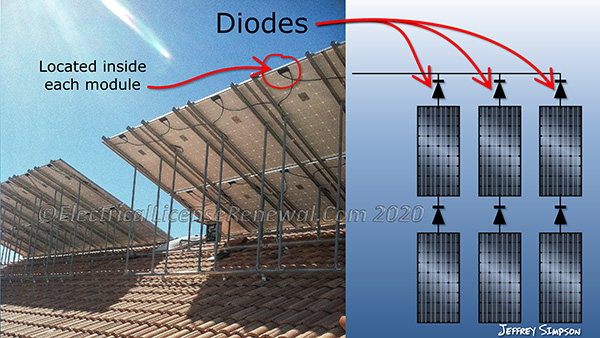690.9(B) Device Ratings.

Code Change Summary: Revised code language permits the use of electronic devices to block reverse DC current used in PV systems.
In past editions of the NEC®, all overcurrent devices used in PV system DC circuits were required to be listed as an overcurrent device.
Many PV modules are equipped with diodes. Diodes are unidirectional, meaning they only allow current to flow in one direction; this is a fundamental property of all diodes.
Diodes can block reverse DC current flow from other parallel strings of PV modules and thus ensure that a module can export current but not allow reverse current to damage the PV module or its associated wiring methods.
Diodes are generally not listed as overcurrent devices but they act instantly to block reverse current flow. Listed overcurrent devices (other than blocking diodes) might have an additional time delay and temporarily allow reverse current to enter the PV module and associated wiring methods before the overcurrent device recognizes the fault condition and opens (trips).
In the 2020 NEC®, a public input was accepted to allow the use of electronic devices (diodes) that are listed to prevent backfeed current in PV system dc circuits.
Below is a preview of the NEC®. See the actual NEC® text at NFPA.ORG for the complete code section. Once there, click on their link to free access to the 2020 NEC® edition of NFPA 70.
2017 Code Language:
690.9(B) Overcurrent Device Ratings. Overcurrent devices used in PV system dc circuits shall be listed for use in PV systems. Overcurrent devices, where required, shall be rated in accordance with one of the following:
(1) Not less than 125 percent of the maximum currents calculated in 690.8(A).
(2) An assembly, together with its overcurrent device(s), that is listed for continuous operation at 100 percent of its rating shall be permitted to be used at 100 percent of its rating.
(3) Adjustable electronic overcurrent protective devices rated or set in accordance with 240.6.
Informational Note: Some electronic overcurrent protective devices prevent backfeed current.
2020 Code Language:
690.9(B) Device Ratings. Overcurrent devices used in PV system dc circuits shall be listed for use in PV systems. Electronic devices that are listed to prevent backfeed current in PV system dc circuits shall be permitted to prevent overcurrent of conductors on the PV array side of the device. Overcurrent devices, where required, shall be rated in accordance with one of the following and permitted to be rounded up to the next higher standard size in accordance with 240.4(B):
(1) Not less than 125 percent of the maximum currents calculated in 690.8(A).
(2) An assembly, together with its overcurrent device(s), that is listed for continuous operation at 100 percent of its rating shall be permitted to be used at 100 percent of its rating.
Informational Note: Some electronic devices prevent backfeed current, which in some cases is the only source of overcurrent in PV system dc circuits.